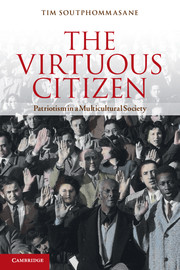6 - Patriotic deliberation and social criticism
Published online by Cambridge University Press: 05 November 2012
Summary
A liberal nationalist theory of citizenship proposes that civic virtue must entail both political and cultural excellences – a requirement that appears best met through cultural patriotism. Yet can such patriotism be truly compatible with the liberal principles of deliberative democracy?
There are four particular points of tension between cultural patriotism and democratic deliberation. First, there is the potential incompatibility between patriotic loyalty and public justification. At issue here is whether a love of country undermines critical autonomy by leading a patriotic citizen to exempt her country from rational criticism. Even if it is possible to criticise aspects of one's nation from within, it remains open to question whether this involves the kind of open engagement implied by a process of deliberation. This leads to a second problem: if patriotic citizens are required to protect their country from fundamental critical appraisal, this could end up producing ‘bad faith’ in deliberation. The moral psychology of patriotism seems to demand a kind of faith in the rightness of one's country, which could lead not only to chauvinism but also to a distorted self-consciousness based on a selective national memory. Third, there is the problem of myth and social power. If citizens should ‘forget’ certain aspects of the national history, the resulting national image could unjustly privilege particular social groups over others. Expressions of patriotism could exclude some minorities, violate deliberative equality and undermine an authentic national identity defined through dialogue. And, finally, there are question marks about the ability of a patriotic citizen to show global concern in the process of democratic deliberation. Does patriotic special concern not rule out a globally responsible form of citizenship?
- Type
- Chapter
- Information
- The Virtuous CitizenPatriotism in a Multicultural Society, pp. 129 - 162Publisher: Cambridge University PressPrint publication year: 2012



